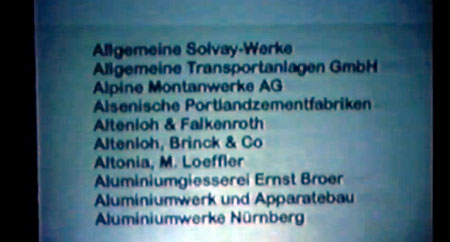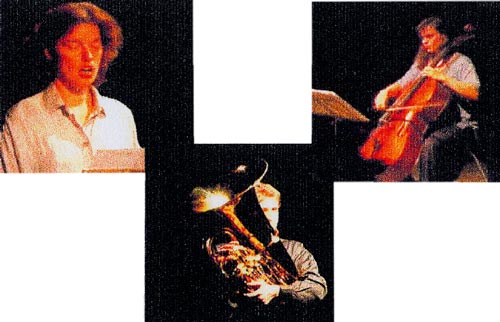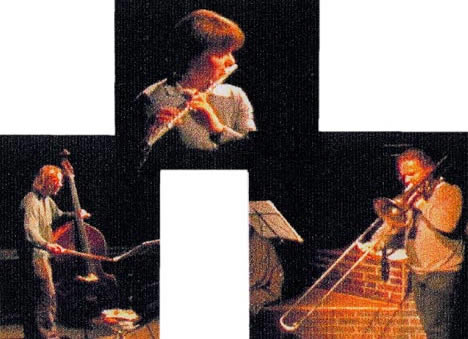| EBBA ROHWEDER de es VIDEO
|
| Flowering Landscape - Forced Labour under National Socialism Scenic composition for ensemble and video, 1997 Premiere: Weiße Rose Cultural Centre, Berlin 1998 Susanne Kukies-voice, Kirsten Reese-flutes, Günter Heinz-trombone, Robin Hayward-tuba, Veronika Otto-cello, Matthias Bauer-double bass |
|
Inspired by a writer friend who gave me an opera libretto she had written on the subject of emigration during National Socialism, I began to research this period, and was surprised to discover how little concrete knowledge I had. I wanted to learn more and began to read numerous books. Repeatedly I came across the topic of forced labour under the Nazi regime, without finding a comprehensive publication on the subject. So I started to collect information from various sources on the subject of forced labour under the Nazi regime and got in direct contact with former forced labourers and their organisations. The composition Flowering Landscape deals musically and gesturally with the subject of forced labour in individual scenes and illuminates it from different perspectives: 6 musicians stand around the audience and start breathing loudly, getting louder and quieter, accentuating the rhythm, ending abruptly. Then only a sleeping person is seen lying on the stage, dazzlingly illuminated by a spotlight.
Another scene is based on a map showing all concentration camps, subcamps and satellite camps: Staff lines cover the map and individual signs are assigned certain performance instructions: individual notes with different dynamics as well as scraping and sweeping sounds. Street names are glimpsed in the silence: the streets on which forced labourers were forced to work are listed. Then the hall goes dark and only a soft sound is heard, which is unexpectedly interrupted by a loud outburst from all the musicians. In the outbursts, individual legal texts are shouted, justifying the rejection of the compensation claims. At the end of the performance, which lasts about 35 minutes, a video is shown listing more than 1,000 companies and businesses that exploited forced labourers, such as AEG, Bosch and Siemens, but also smaller companies such as Weleda. I have compiled this list from various sources: it is now known that forced labourers were exploited by more than 90% of German companies and in agriculture, but also by municipalities and church institutions. |
|


